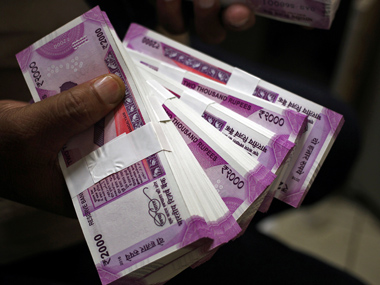Mumbai: The combined fiscal deficit of the Centre and states will top 12 percent of the GDP because of the recent economy-boosting measures, and higher borrowings by States to meet COVID-19 exigencies, says a report. According to the report by DBS Bank, the combined fiscal gap will increase by 480 basis point (bps). In the case of the Centre, the fiscal gap will increase by 200 bps as earlier this month it hiked market borrowings by a whopping Rs 4.2 lakh crore or 54 percent over the budget estimate to Rs 12 lakh crore, citing the pandemic. Another 80 bps increase will be on account of the fiscal boost. In the case of states, the fiscal gap will rise by 200 bps after the Centre hiked the borrowing limit of states to 5 percent of GSDP on Sunday. [caption id=“attachment_6013191” align=“alignleft” width=“380”] Representational image. Reuters[/caption] While the government claims it is pump-priming the pandemic stricken economy by a whopping Rs 20.9 lakh crore (10 percent of the GDP) package, in actual fiscal outgoes, this converts only into a paltry 0.8 percent of GDP, even though it has hiked the borrowing by a whopping Rs 4.2 lakh crore. On Sunday, the Centre also allowed states to borrow 2 percent more of their GSDP with strict reform conditions. Earlier, they were allowed to borrow 3 percent. “In all, from the total Rs 20.9 lakh package, the immediate fiscal slippage for the Centre will be a modest 0.8 percent of the GDP,” DBS economist Radhika Rao said in a note on Monday. Considering all the fiscal packages announced till now,“the cumulative fiscal slippage is likely to be around 7 percent of GDP, which is in line with our expectations as the Centre had last week hiked the borrowings by 2 percent," she said. States’’ increased borrowing limit and other factors will potentially take “the overall borrowings to 12 percent of GDP,” she added. The higher borrowing by states, which are actually spending much more than the Centre on COVID-19 control and management, will involve relaxing the Fiscal Responsibility and Budget Management Act (FRBM) guidelines. This 2 percent more borrowing will increase their debt issuance by Rs 4.3 lakh crore. However, this is tied to strict milestones in four key areas –adoption of ‘‘One Nation One Ration Card’’, reforms of local urban bodies, reforms on power sector distribution companies and ease of doing business. Accordingly, the first 0.5 percent increase (to 3.5 percent) is unconditional, but the next 1 percent jump will be in four phases, linked to the above reforms being rolled out and if the targets are met in three of the four reforms, the last 0.5 percent increase kicks in. Of the Rs 20.9 lakh crore package, as much as Rs 8.1 lakh crore is additional liquidity offered by the RBI since February, and Rs 11 lakh crore or 5.2 percent of GDP includes credit guarantees worth Rs 3 lakh crore which are outlays that don’t add to the fiscal deficit but are reflected in contingent liabilities and thereby in overall debt. Lastly, push towards reforms will also not involve near-term disbursements, thus carrying minimal financial impact. In all, the immediate fiscal slippage from these measures will be at 0.8 percent of GDP. “Bulk of the near-term relief is directed at easing credit unavailability for non-banks and MSMEs, whilst also supporting vulnerable sections, including migrant labourers and street vendors etc. Further policy support, as and when deemed necessary, is likely to carry an emphasis on financial sector health, including a capital backstop for banks, DBS noted.
The combined fiscal deficit of the Centre and states will top 12 percent of the GDP because of the recent economy-boosting measures, and higher borrowings by States to meet COVID-19 exigencies, says a report
Advertisement
End of Article


)

)
)
)
)
)
)
)
)



